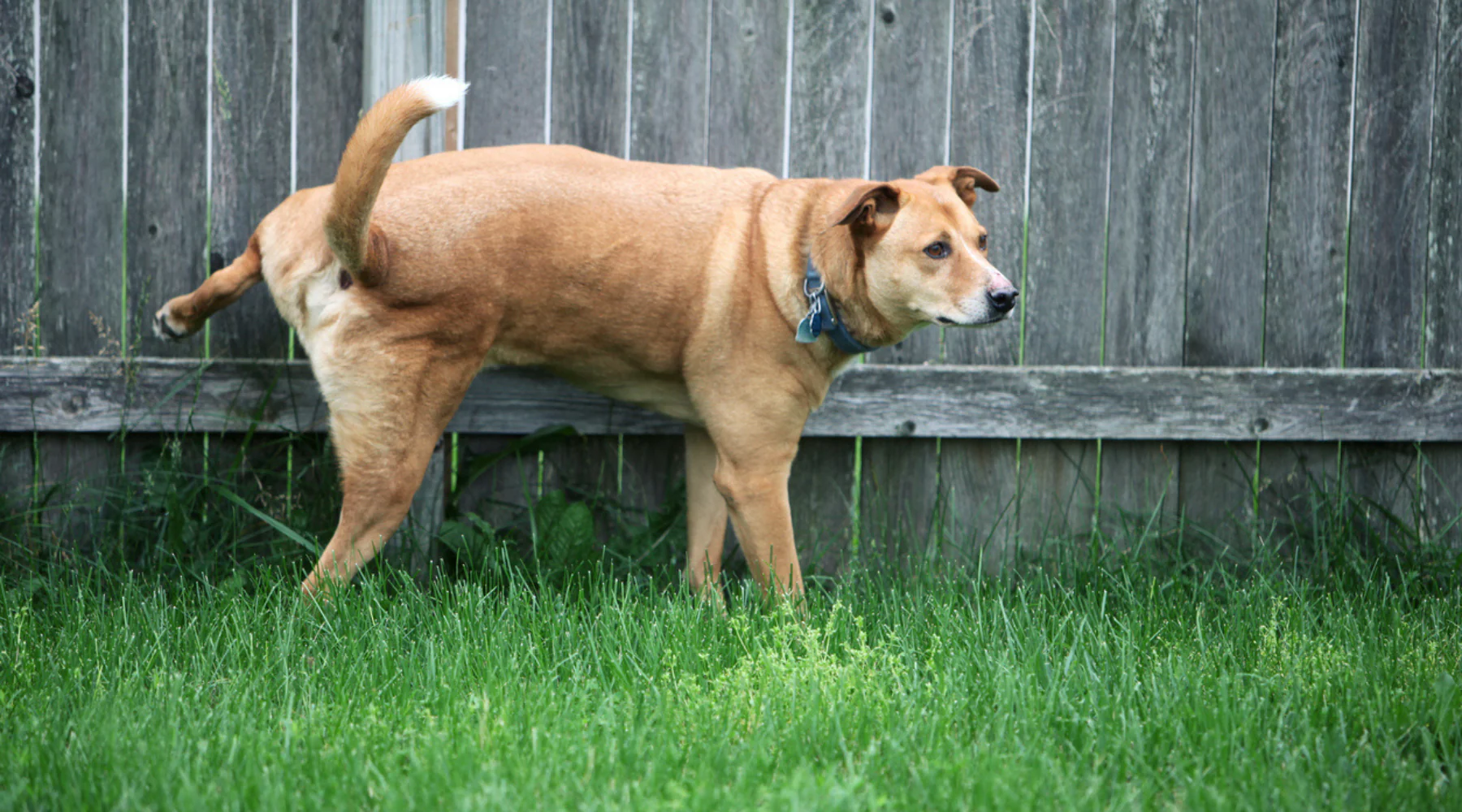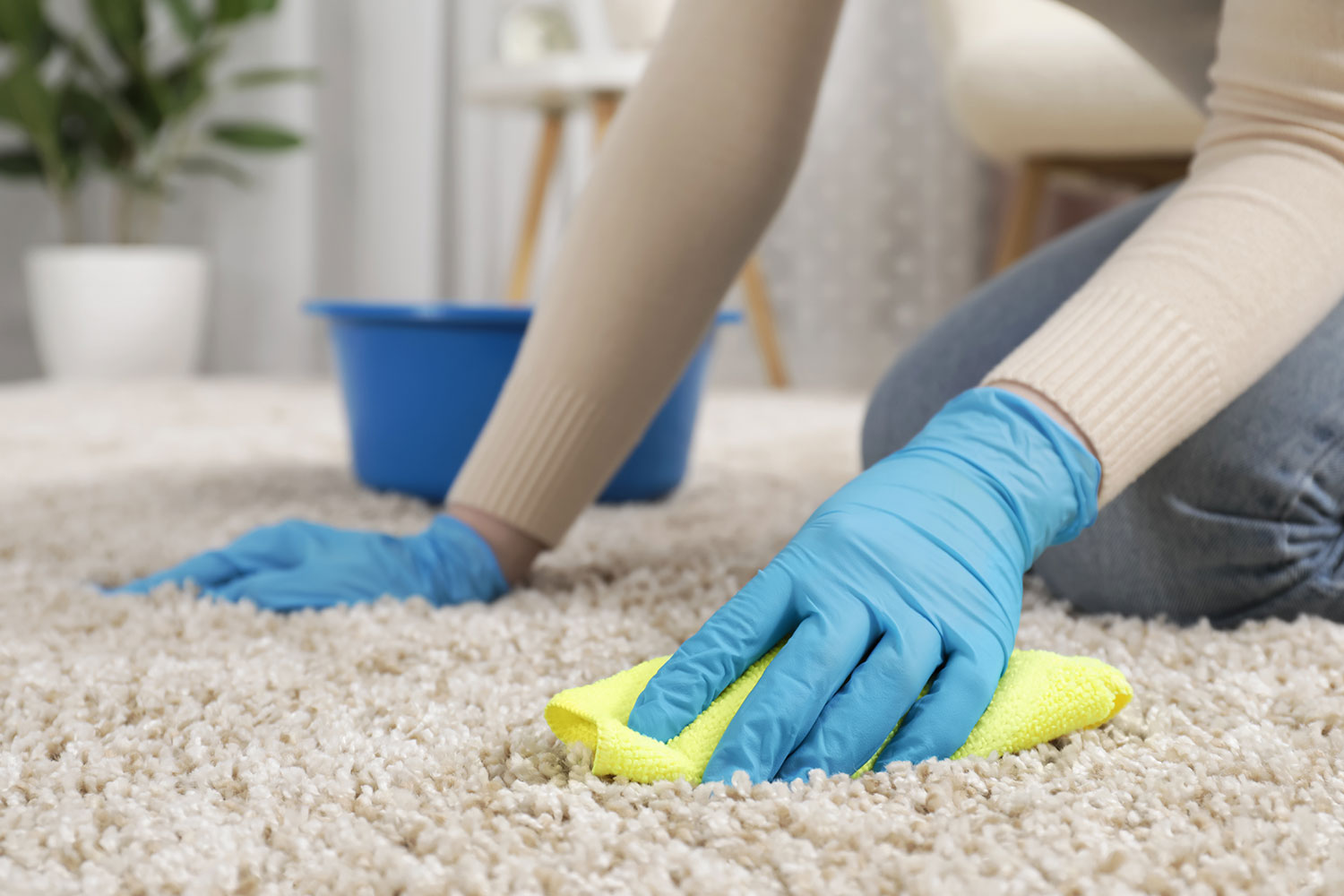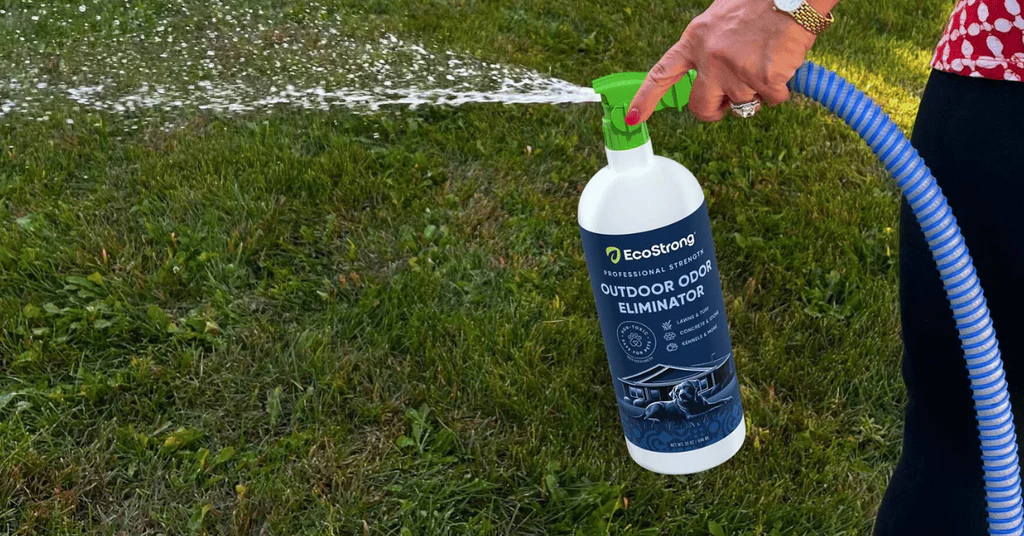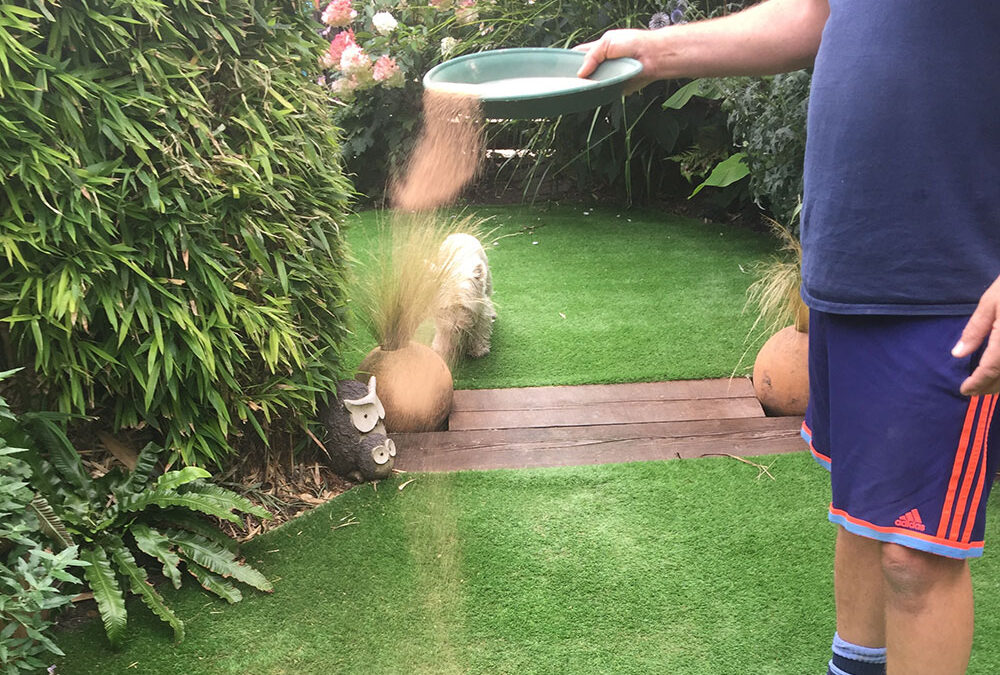Nothing ruins a relaxing day in the yard faster than that stubborn smell of dog pee. I know how frustrating it is when you’ve cleaned up after your pup but the odor still lingers, making it tough to truly enjoy your outdoor space. The good news is you don’t have to live with that smell forever.
Getting rid of dog pee odor outside takes more than just a quick rinse with the hose. With the right approach, you can banish those unpleasant scents for good and keep your yard fresh. I’ll walk you through simple, effective steps that actually work so you and your four-legged friend can both enjoy the outdoors again.
Understanding the Problem: Why Dog Pee Smell Lingers Outside

Understanding-the-Problem-Why-Dog-Pee-Smell-Lingers-Outside
Dog urine odor lingers outside mainly due to a combination of chemical compounds and environmental factors. Urine contains urea, ammonia, uric acid, and various bacteria that break down waste. These compounds sink into grass, soil, concrete, and porous surfaces, making the smell persistent even after rain or rinsing.
Multiple repeats of dog urination in the same spot raise the concentration of odor-causing chemicals. Hot and humid weather accelerates bacterial growth and intensifies the smell, while cool or dry conditions slow the breakdown but let residues accumulate over time. Soil composition, like clay or compacted dirt, traps more odor than sand or gravel.
Rinsing with water dilutes fresh urine, but without breaking down the uric acid crystals or removing embedded bacteria, the smell quickly returns once the area dries. Only targeted treatments disrupt these chemical bonds and lift the odor from below the surface.
Common Dog Urine Compounds Causing Odor
| Compound | Property | Odor Description | Persistence (Days) | Typical Removal Methods |
|---|---|---|---|---|
| Ammonia | Volatile, alkaline | Sharp, pungent | 1-2 | Water dilution, enzymatic cleaners |
| Uric acid | Low solubility, crystal | Musty, sour | 7-10 | Enzyme treatments, oxidizers |
| Urea | Readily breaks to ammonia | Neutral, mild at first | 1 | Water flushing, bacterial breakdown |
| Bacteria | Diverse metabolic waste | Rotting, foul | Variable | Disinfectants, sun exposure |
Factors Affecting Outdoor Dog Urine Odor
| Factor | Effect on Odor Linger | Example Contexts |
|---|---|---|
| Surface Type | Porous retains more odor | Soil, concrete |
| Weather | Heat/humidity intensify odor | Summer, rain |
| Sun Exposure | UV helps break down compounds | Open yards |
| Frequency | Repeated soiling worsens it | One favorite spot |
Immediate Steps to Neutralize Fresh Dog Pee Smell

Immediate-Steps-to-Neutralize-Fresh-Dog-Pee-Smell
I quickly address fresh dog pee smell by removing excess moisture and neutralizing odor before compounds set in. These steps prevent long-term outdoor odors and support a cleaner space for pets and people.
Blotting and Removing Excess Moisture
I start by blotting fresh dog urine outside, using absorbent cloths or paper towels to soak up as much liquid as possible. Fast removal prevents odor from penetrating concrete, grass, or soil. Once blotted, I thoroughly rinse the area with plenty of water to dilute any residual urine and minimize odor intensity.
| Step | Tools Needed | Purpose |
|---|---|---|
| Blot fresh urine | Cloths, paper towels | Absorb moisture before it seeps in |
| Rinse with water | Hose, buckets | Dilute leftovers and flush away urine |
Applying Natural Odor Neutralizers
I apply natural odor neutralizers to target chemical compounds in dog urine and reduce lingering outdoor smells. Baking soda, vinegar, and combination sprays work best for immediate odor control.
| Neutralizer | Application Method | Key Notes |
|---|---|---|
| Baking soda | Sprinkle, let sit 30+ min, rinse | Absorbs odor; prolonged exposure may affect plant/soil health |
| Vinegar (diluted) | Spray, sit 5–10 min, rinse | Neutralizes smell; doesn’t fully break down uric acid |
| Combo (vinegar + soda) | Mix and spray, repeat as needed | Enhances natural breakdown; safe for most plants/pets |
I avoid harsh chemicals, like bleach, since they’re unsafe for pets and harm outdoor surfaces. Regular hosing helps prevent recurrent odors, especially in areas where dogs pee often.
These immediate actions, when done right away, neutralize the majority of fresh dog pee smells before they become stubborn odor problems.
Deep Cleaning Techniques for Persistent Odors
Persistent dog pee odors outside embed in porous surfaces and resist basic rinsing. I apply targeted deep cleaning methods to reach and remove odor compounds below the surface.
Using Enzyme-Based Cleaners
Enzymatic cleaners tackle dog pee smell at the chemical level. I use products with live bacteria that digest uric acid and organic residues, removing the cause instead of masking the odor. I saturate the smelly area thoroughly, then cover it with plastic wrap and keep it wet for several hours or overnight to allow enzymes to work. If the stain’s old or strong, I repeat this process for full breakdown.
Table: Enzyme Cleaner Usage Guidelines
| Cleaner Type | Application Time | Recommended Coverage | Repeat Needed |
|---|---|---|---|
| Outdoor Enzymatic Spray | 4-12 hours | Heavy saturation + covering | Yes, for old stains |
| General Enzyme Liquid | 2-8 hours | Apply generously to affected | As needed |
Homemade Cleaning Solutions
For areas where I want safe, cost-effective odor removal, homemade cleaning agents like baking soda and vinegar are options. I create a baking soda paste (baking soda and water), apply it to the affected spot, let it sit for 10 minutes, then scrub and rinse thoroughly. For concrete or wood, I mix vinegar and water at a 1:1 ratio, test on a small patch to avoid discoloration, apply, wait ten minutes, then rinse well. I avoid harsh chemicals including bleach since these harm grass, plants, pets, and beneficial soil microbes.
Table: Homemade Solution Effectiveness for Odors
| Solution Type | Use Surface | Required Dwell Time | Notes |
|---|---|---|---|
| Baking Soda Paste | All surfaces | 10 min | Effective for general odor neutralizing |
| Vinegar & Water Mix | Concrete, Wood | 10 min | Test for discoloration on all surfaces |
Pressure Washing and Rinsing
Pressure washing dislodges residual pee and cleaning agents from large outdoor spaces. Once I’ve applied enzymatic or homemade cleaners, I use a pressure washer or strong hose stream to rinse thoroughly. This step clears both the surface and subsurface layers, which is crucial for porous materials like concrete or weathered wood.
Table: Pressure Washing by Surface Type
| Area Surface | Washer Pressure Level | Ideal Frequency |
|---|---|---|
| Concrete Patio | High | After every deep cleaning |
| Wooden Deck | Medium-High | Monthly or after accidents |
| Artificial Grass | Medium | Bi-weekly for persistent use |
Preventative Measures to Keep Outdoor Spaces Fresh
Consistently preventing dog pee odors outside relies on targeted methods and strategic routines. I use proactive training, maintain regular cleaning habits, and adjust landscaping for lasting freshness.
Training Your Dog to Use Designated Areas
I limit outdoor dog pee smells by steering my dog to one designated spot every time. Positive reinforcement, like treats or consistent praise, reinforces this routine. Installing gravel, mulch, or artificial turf patches in a low-traffic corner pairs effective training with simple odor management. Dog potty patches and similar aids minimize widespread urine spots and make cleanup straightforward.
Training Techniques Table
| Training Method | Effectiveness | Maintenance Needed | Surface Example |
|---|---|---|---|
| Positive reinforcement (treats/praise) | High (with routine) | Moderate | Grass, gravel, turf |
| Dog potty patch | High | Low | Artificial turf, tray |
| Gravel or mulch zone | Medium | Low | Pebbled area, mulch bed |
Regular Maintenance and Cleaning Tips
Frequent rinsing, at least every other day, dilutes urine and stops odor buildup. I apply enzymatic cleaners weekly to break down trapped urine molecules in soil or concrete, targeting areas where my dog prefers to urinate. Outdoor-safe odor eliminator sprays keep porous surfaces like concrete or pavers fresh. I avoid harsh chemicals to protect pets and plants.
Cleaning Solution Comparison Table
| Cleaner Type | Main Ingredient | Target Surface | Pet-Safe | Odor Neutralization |
|---|---|---|---|---|
| Water rinse | Water | Grass, concrete | Yes | Dilutes only |
| Vinegar-water solution | Acetic acid | Concrete, soil | Yes | Neutralizes ammonia |
| Baking soda | Sodium bicarbonate | Soil (rinsed after) | Yes | Absorbs odor |
| Enzymatic product | Live bacteria/enzymes | Soil, turf, concrete | Yes | Breaks down urine |
Landscaping Ideas to Minimize Odors
I reduce recurring odors by choosing outdoor surfaces and plants that manage urine better. Artificial turf with drainage allows effective rinsing, preventing urine pooling and smell retention. I plant hardy vegetation tolerant of higher soil pH, like buffalo grass or certain herbs, along urine zones to mask and withstand ammonia effects. Periodic turning of soil and hosing down targeted areas further ventilates and freshens the space.
| Landscaping Feature | Odor Management Benefit | Example Material |
|---|---|---|
| Artificial turf with drainage | Fast urine drainage, easy rinse | Synthetic pet turf |
| Gravel/mulch potty area | Odor containment, easy removal | Pea gravel, cedar mulch |
| Scent-masking plants | Absorb/cover up odor naturally | Lavender, rosemary |
| Soil aeration/turning | Neutralize trapped smells | Bare soil, garden beds |
Products and Tools That Help Remove Outdoor Pee Smell

Products-and-Tools-That-Help-Remove-Outdoor-Pee-Smell
I use targeted products and tools to address outdoor dog pee smell quickly and thoroughly. Combining natural methods with commercial solutions gives me consistent, effective results.
Recommended Commercial Odor Removers
Commercial odor removers for outdoor spaces break down and eliminate urine, neutralizing lingering smells. I select enzyme-based formulas for their ability to degrade uric acid and organic residues in dog pee. Products with higher microbial counts and multiple strains, like EcoStrong’s Outdoor Odor Eliminator, act within 12 to 24 hours.
Comparison Table: Top Outdoor Odor Removers
| Product Name | Key Ingredient Type | Effective Time | Microbial Count | Suitable For |
|---|---|---|---|---|
| EcoStrong Outdoor Odor Eliminator | Bio enzymatic formula | 12–24 hours | High | Grass, concrete, soil |
| Simple Solution Yard Odor Away | Enzymatic cleaner | 24 hours | Moderate | Lawns, patios |
| Nature’s Miracle Yard Odor Remover | Bacterial enzyme | 4–8 hours | Moderate | Large outdoor areas |
Enzymatic cleaners tackle uric acid and proteins in urine, discouraging repeat marking and providing deep odor removal even after weather events.
Essential Tools for Outdoor Cleaning
Tools help me apply cleaners evenly and protect my outdoor surfaces. I rely on:
- Spray bottles: I use spray bottles for controlled application of vinegar-water mixtures or enzyme cleaners to specific odor spots.
- Garden hose with sprayer: Rinsing treated areas is fast and thorough with a garden hose and adjustable sprayer, ensuring removal of residues.
- Protective gloves: Handling concentrated cleaning solutions with protective gloves guards my hands from irritation.
Tools Overview Table
| Tool | Primary Function | Recommended Use Case |
|---|---|---|
| Spray bottle | Apply liquid cleaners evenly | Baking soda, vinegar, enzymes |
| Garden hose with attachment | Rinse and dilute contaminants outdoors | Post-cleaner application |
| Protective gloves | Shield skin from strong or concentrated agents | Handling chemical cleaners |
Combining these tools with quality odor removers eliminates dog pee smell at the molecular level and prevents repeat odor buildup. Focusing on frequent-use zones and reapplying enzymatic treatments targets persistent problem spots effectively.
Conclusion
Dealing with dog pee smell outside doesn’t have to be a losing battle. With the right approach and a little consistency, I’ve found it’s absolutely possible to keep my yard smelling clean and inviting. Taking action as soon as I notice a problem, sticking to safe cleaning methods, and using proven products has made all the difference.
Now I can enjoy my outdoor space without worrying about lingering odors, and my dog is happier too. If you’re ready to reclaim your yard, these strategies will help you get there.
Frequently Asked Questions
Why does dog urine smell linger outdoors even after it rains?
Dog urine contains urea, ammonia, uric acid, and bacteria, which penetrate grass, soil, and concrete. Rainwater may dilute but cannot break down these compounds, especially uric acid crystals. As a result, the odor persists until the chemical bonds and embedded bacteria are properly cleaned and neutralized.
Will simply rinsing dog urine with water remove the smell?
No, rinsing with water only helps dilute fresh urine and may temporarily mask the odor. It does not break down or remove uric acid crystals and bacteria, which are responsible for lingering smells. Targeted treatments are needed for complete odor removal.
What are the best immediate steps to remove fresh dog pee smell outside?
Blot up as much urine as possible with absorbent cloths, rinse the area with water, and apply a natural odor neutralizer such as baking soda or a vinegar-water solution. Avoid using harsh chemicals, as they could harm your pets or damage outdoor surfaces.
How can I remove set-in dog urine odor from grass or concrete?
Deep clean with enzyme-based cleaners, which break down uric acid and organic residues. Let the cleaner sit for the recommended time before rinsing. You can also use homemade solutions like baking soda paste or vinegar and water for cost-effective odor removal.
What preventative measures can help keep my yard smelling fresh?
Regularly rinse areas where pets urinate, use enzyme-based cleaners routinely, and train your dog to use a designated potty spot. Installing materials like gravel, artificial turf with drainage, or odor-absorbing plants can also help minimize recurring odors.
Are commercial odor removers safe for pets and the environment?
Most enzyme-based commercial odor removers are pet-friendly and biodegradable. Always check the product label for safety instructions to ensure it’s suitable for outdoor use around pets and plants.
Which outdoor odor remover products work best for dog pee smell?
Highly rated products include EcoStrong’s Outdoor Odor Eliminator and Nature’s Miracle Yard Odor Remover. These enzyme-based cleaners are designed for outdoor use and are effective at degrading the stubborn compounds in dog urine.
What tools are recommended for cleaning dog urine outdoors?
Essential tools include a spray bottle for applying cleaner, a garden hose for rinsing, and protective gloves to handle cleaning agents. For deep cleaning, a pressure washer may be helpful for larger or heavily used areas.
How often should I clean outdoor pet potty areas?
Clean high-traffic potty areas at least once a week. Immediate spot rinsing and odor neutralization after each use can help prevent buildup and keep your yard smelling fresh.
Can landscaping help reduce dog urine odor?
Yes, using odor-absorbing plants, installing artificial turf with good drainage, or creating designated gravel potty zones can greatly reduce odors. Strategic landscaping helps isolate and manage urine, making outdoor cleanup easier and more effective.

